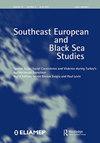土耳其对欧盟制裁俄罗斯的积极抗辩:欧洲规范秩序与地缘政治现实
IF 0.8
2区 社会学
Q2 AREA STUDIES
引用次数: 0
摘要
摘要本文对第三国在欧洲规范秩序中参与规范争论进行了批判性的讨论。本文实证考察了候选国土耳其对欧盟最近针对俄罗斯的制裁政策的外部争论,并详细阐述了土耳其对欧盟制裁政策的规范性有效性提出质疑和重新谈判的背景。该研究从经验上表明,土耳其虽然在行为上不遵守欧洲的规范秩序,但却进入了欧洲的规范秩序,并通过谈判实现了不结盟的规范性。在这场积极的辩论中,政治精英们在国内政治中广泛讨论了该国立场的规范性和制裁政策的无效性。最终,土耳其违背了欧盟对候选国的期望,将关于制裁的规范性独白变成了关于联合行动有效性主张的合法规范分歧的多重对话。关键词:欧盟俄罗斯-乌克兰战争土耳其制裁争端感谢两位匿名审稿人提出的宝贵意见和建议。披露声明作者未报告潜在的利益冲突。鉴于篇幅和范围有限,本文无法充分阐述土耳其与欧盟之间关系的全面历史记录;有关双边关系的广泛历史记录,请参见Nas和Özer (Citation2016);Reiners and Turhan (citation) 2021 .2。一家土耳其私人防务公司,专门从事无人驾驶飞行器,以与总统Erdoğan和正义与发展党关系密切而闻名。必须注意的是,所有武器贸易都必须得到土耳其国防部的确认(官方公报Citation2022)。本研究未获得专项资助。作者简介:本文作者是安卡拉Hacettepe大学国际关系系助理教授。Renda拥有伦敦国王学院欧洲和国际研究博士学位。他在埃塞克斯大学获得欧洲研究硕士学位。他一直在Hacettepe大学讲授土耳其外交政策、欧盟和研究方法。主要研究领域为土耳其外交政策、欧盟共同外交与安全政策以及安全研究。Ali Onur ÖzçelikAli Onur Özçelik是Eskisehir Osmangazi大学国际关系系的副教授和全职讲师。他在谢菲尔德大学政治系获得博士学位。他的研究兴趣包括非国家行为者的政治,跨国社会运动,非国家行为者和有限承认国家的外交,以及欧盟的邻里政策。他是两本书的合著者:帕尔格雷夫出版的《世界共同体与阿拉伯之春》和《欧盟在土耳其的限制:何时起作用?》什么时候会失败?,由Rowman & Littlefield出版社出版。他也是让·莫内网络项目的研究员,该项目名为“连接欧洲外围”(LEAP)。他是土耳其里兹雷杰普·塔伊普·埃尔多安大学国际关系系副教授。他的研究主要集中在规范接受/传播、跨国主义、方法论世界主义和民族政治。他最近的一些作品发表在《亚洲妇女研究杂志》、《亚非研究杂志》、《全球社会》、《和平评论》和uluslararasyi İlişkiler/国际关系杂志上。本文章由计算机程序翻译,如有差异,请以英文原文为准。
Turkey’s proactive contestation of EU sanctions against Russia: European normative order vs. geopolitical realities
ABSTRACTThis article offers a critical discussion of third-country access to normative contestation within the European normative order. It empirically examines the external contestation of the EU’s recent sanctions policy directed towards Russia by Turkey, a candidate state, and elaborates on the context in which Turkey contested and renegotiated the normative validity of the EU’s sanction policy. The study empirically suggests that Turkey, while behaviourally practising non-compliance, accessed the European normative order and negotiated the normativity of its non-alignment. In the making of this proactive contestation, the normativity of the country’s positions and the invalidity of the sanctions policy have been widely negotiated in domestic politics by the political elites. Eventually, Turkey, against the EU’s expectations from a candidate state, turned the normative monologue on the sanctions into a multilogue of legitimate normative differences on the validity claims of a united action.KEYWORDS: European UnionRussia-Ukraine warTurkeysanctionscontestation AcknowledgementsWe would like to thank the two anonymous reviewers for their valuable comments and suggestions.Disclosure statementNo potential conflict of interest was reported by the author(s).Notes1. The comprehensive historical record of the relationship between Türkiye and the EU cannot be fully articulated in this article, given its limited length and scope; for the extensive historical record of the bilateral relationship, see Nas and Özer (Citation2016); Reiners and Turhan (Citation2021).2. A private Turkish defence company specializing in unmanned aerial vehicles, known for its close relations with President Erdoğan and the Justice and Development Party.3. One must note that all arms trade has to be confirmed by the Turkish Ministry of National Defence (Official Gazette Citation2022).Additional informationFundingThis research received no specific grant.Notes on contributorsKadri Kaan RendaKadri Kaan Renda is an assistant professor in the Department of International Relations at Hacettepe University, Ankara. Renda holds a PhD in European and International Studies from Kings College London. He received his master’s degree in European Studies from the University of Essex. He has been giving lectures on Turkish foreign policy, the European Union, and Research Methods at Hacettepe University. His research interests are Turkish foreign policy, the common foreign and security policy of the EU, and security studies.Ali Onur ÖzçelikAli Onur Özçelik is an associate professor and a full-time lecturer in the Department of International Relations at Eskisehir Osmangazi University. He gained his PhD in the Department of Politics at the University of Sheffield. His research interests involve the politics of non-state actors, transnational social movements, diplomacy for non-state actors and states with limited recognition, and the EU’s Neighbourhood Policy. He is a co-editor of two books: ‘The World Community and Arab Spring,’ published by Palgrave, and ‘EU Conditionality in Turkey: When Does It Work? When Does It Fail?,’ published by Rowman & Littlefield. He has also been working as a researcher for the Jean Monnet Networking Project called Linking to Europe at the Periphery (LEAP).Hüsrev TabakHüsrev Tabak is an associate professor in the Department of International Relations at Recep Tayyip Erdogan University in Rize, Turkey. His research focuses on norm reception/diffusion, transnationalism, methodological cosmopolitanism, and ethnopolitics. Some of his recent work has appeared in the Asian Journal of Women’s Studies, Journal of Asian and African Studies, Global Society, Peace Review, and Uluslararası İlişkiler/International Relations.
求助全文
通过发布文献求助,成功后即可免费获取论文全文。
去求助
来源期刊

Southeast European and Black Sea Studies
AREA STUDIES-
CiteScore
3.00
自引率
19.00%
发文量
73
期刊介绍:
The aim of the journal is to establish a line of communication with these regions of Europe. Previously isolated from the European mainstream, the Balkan and Black Sea regions are in need of serious comparative study as are the individual countries, no longer "at the edge" of Europe. The principal disciplines covered by the journal are politics, political economy, international relations and modern history; other disciplinary approaches are accepted as appropriate. The journal will take both an academic and also a more practical policy-oriented approach and hopes to compensate for the serious information deficit on the countries under consideration.
 求助内容:
求助内容: 应助结果提醒方式:
应助结果提醒方式:


